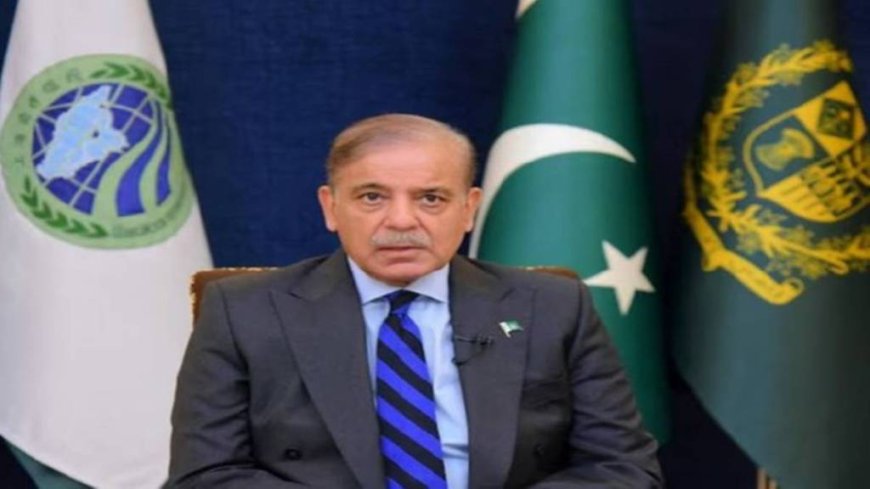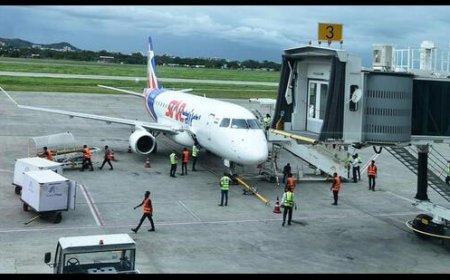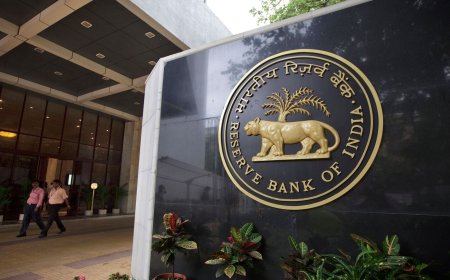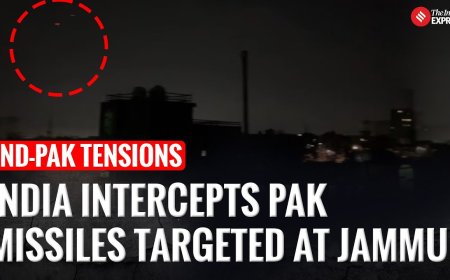Pakistan PM Confirms Indian Missile Strikes; Army Chief Munir Alerted Sharif at 2:30 AM
Pakistan PM Shehbaz Sharif confirms Indian missile strikes across the border. Army Chief Gen. Asim Munir reportedly alerted the PM in the early hours. Full analysis inside.

Pakistan PM Shehbaz Sharif Confirms Indian Missile Strikes, Says Army Chief Munir Alerted Him at 2:30
AM
Introduction: Midnight Missiles & Early Morning Crisis
In a dramatic development that has escalated already high tensions between India and Pakistan, Pakistan’s Prime Minister Shehbaz Sharif confirmed that Indian missile strikes had taken place in the early hours of the morning. Speaking at a high-level press briefing in Islamabad, the Pakistani premier disclosed that Army Chief General Asim Munir alerted him to the missile activity as early as 2:30 AM, triggering an emergency response from the country’s top security brass.
The statement from the Prime Minister comes after days of speculation, unverified satellite imagery, and conflicting local media reports. This is the first official confirmation from Islamabad regarding direct kinetic action by India, and it signals a shift in regional security dynamics.
The Event: What Actually Happened?
According to Sharif’s briefing and multiple corroborated military sources, at approximately 2:15 AM, Indian defense forces launched a precision missile strike across the Line of Control (LoC) targeting what New Delhi claims were “active terror infrastructure and logistical nodes.”
Key Details:
-
Time of Strike: Approx. 2:15 AM IST
-
Alert Sent to PM: 2:30 AM PKT by Gen. Munir
-
Targeted Zones: Forward supply depots and communication bunkers believed to be aiding infiltrators
-
Indian Stance: "A calibrated and non-escalatory precision strike"
Indian defense officials, although not offering direct confirmation, issued a carefully worded statement emphasizing “India’s commitment to neutralizing threats proactively while respecting territorial integrity.” This aligns with previous doctrines of "pre-emptive self-defense."
General Munir’s Role: The Man at the Helm
General Asim Munir, Pakistan's Army Chief, is said to have played a crucial role in swiftly activating the country’s National Command Authority and initiating immediate surveillance and damage assessment protocols.
His timely alert to PM Sharif reflects not only the seriousness of the strike but also points to the preparedness of Pakistan’s military establishment despite its current domestic challenges. According to Islamabad-based defense analysts, Munir's direct call to the Prime Minister at 2:30 AM was followed by an emergency meeting at GHQ Rawalpindi involving ISI, the Air Force, and senior defense strategists.
Shehbaz Sharif’s Statement: A Mix of Confirmation and Caution
Speaking during a joint press briefing with Foreign Minister Ishaq Dar, Shehbaz Sharif stated:
“I was informed by General Munir at 2:30 AM that missile activity was detected and confirmed near our forward positions. While Pakistan reserves the right to respond at a time and place of its choosing, we are assessing the full spectrum of the incident before escalation.”
This calibrated tone suggests that Pakistan is currently choosing to tread cautiously, possibly weighing the situation in light of its economic vulnerabilities and global geopolitical constraints.
Geopolitical Implications: Why This Strike Matters
This is not just a border skirmish. The confirmed missile strike adds a significant dimension to Indo-Pak relations, especially amid India’s rising global stature and Pakistan’s internal political instability. Key implications include:
1. Reaffirmation of India’s Pre-Emptive Doctrine
India has reiterated time and again that it will not wait for an attack to act. This strike reaffirms the Balakot-era doctrine of proactive military response to credible terror threats.
2. Pakistan's Strategic Dilemma
Caught between IMF mandates, political turbulence, and military fatigue, Pakistan finds itself in a corner—needing to respond to maintain credibility without inviting economic or military ruin.
3. International Watchdog Role
Global actors like the United States, China, and the United Nations will now play a crucial role in de-escalation. With elections around the corner in both countries, global pressure will be key.
Ground Reports: Smoke Trails, Sirens, and Silent Skies
Multiple local journalists and social media users from Muzaffarabad and Neelum Valley reported hearing “a loud burst” followed by military sirens. Video footage shows columns of smoke rising near what were believed to be underground logistics bunkers.
While Pakistan has not released casualty or structural damage reports, the intermittent blackout in mobile services and restricted media access suggests that the military is still evaluating the full extent of impact.
India’s Tactical Rationale: Eliminating "Non-State" Proxies
Indian defense analysts suggest that the strikes were surgical in nature, targeting:
-
Makeshift arms stockpiles
-
Terror staging grounds
-
Cross-border communication posts
The precision and timing suggest detailed intelligence coordination between RAW, the Indian Air Force, and Military Intelligence. With minimal collateral damage, the strike appears to have been designed to send a message rather than trigger a war.
Strategic Analysts Speak: Mixed Signals
Indian Perspective – Lt. Gen. R.K. Narang (Retd.):
“The operation was necessary, calibrated, and in line with India’s national security doctrine. We are not looking to escalate, but we won’t tolerate preparatory terror movements along our borders.”
Pakistani View – Lt. Gen. Amjad Shoaib (Retd.):
“While India claims precision, it is a violation of sovereign space. Pakistan must respond, even symbolically, to restore deterrence.”
International Voices:
The U.S. State Department has urged “maximum restraint,” while UN Secretary-General Antonio Guterres has called for “both parties to avoid any action that may further deteriorate the fragile peace.”
Legal and Diplomatic Fallout
Pakistan is reportedly preparing to raise the issue at the United Nations General Assembly (UNGA) and plans to summon India’s Deputy High Commissioner in Islamabad for a formal diplomatic protest.
Meanwhile, Indian missions abroad have been advised to be on heightened alert, and confidential circulars suggest increased monitoring of Indian diplomatic assets in sensitive regions like the Middle East and Europe.
Timeline Recap: A Rapid Chain of Events
| Time | Event |
|---|---|
| 2:15 AM IST | Indian missile strike launched |
| 2:30 AM PKT | Gen. Munir alerts PM Shehbaz Sharif |
| 3:00 AM PKT | Emergency meeting at GHQ Rawalpindi |
| 6:00 AM IST | India issues "no comment" statement |
| 9:30 AM PKT | Sharif publicly confirms the strike |
| 1:00 PM IST | MEA India releases calibrated statement |
Public Sentiment: The Internet Reacts
Social media platforms across both countries exploded with opinions:
-
In India, hashtags like #SurgicalStrike2 and #NoMoreTolerance trended.
-
In Pakistan, #ViolationOfSovereignty and #StandWithArmy gained traction.
Citizens on both sides have called for peace, but nationalistic voices continue to fuel the digital battlefield, raising concerns of miscommunication or escalation via misinformation.
What Happens Next: Watchpoints
-
Pakistan’s Military Response
Limited artillery shelling? Airspace violations? Diplomatic route? The nature of response will dictate the course ahead. -
India’s Political Messaging
With elections looming, the government may frame this strike as a success in counter-terror defense. -
Global Mediation
The next 48 hours may see behind-the-scenes mediation from Washington, Beijing, or Riyadh. -
Economic Impact
Markets, already jittery from global uncertainty, may react negatively if the standoff worsens.
A Dangerous but Measured Gamble
The confirmation by Pakistan's PM Shehbaz Sharif of Indian missile strikes signals a serious but measured escalation in the Indo-Pak conflict theatre. The fact that General Munir alerted the civilian leadership in real-time shows a certain level of institutional maturity and preparedness. On the Indian side, the precision of action and its limited scope reflect a cold, calibrated warning rather than a declaration of war.
Both nations now stand at a critical juncture: to either choose the path of mature deterrence or fall into another round of retaliatory escalation. The world is watching — but for once, the decision rests squarely in New Delhi and Islamabad.
What's Your Reaction?
 Like
0
Like
0
 Dislike
0
Dislike
0
 Love
0
Love
0
 Funny
0
Funny
0
 Angry
0
Angry
0
 Sad
0
Sad
0
 Wow
0
Wow
0












































































